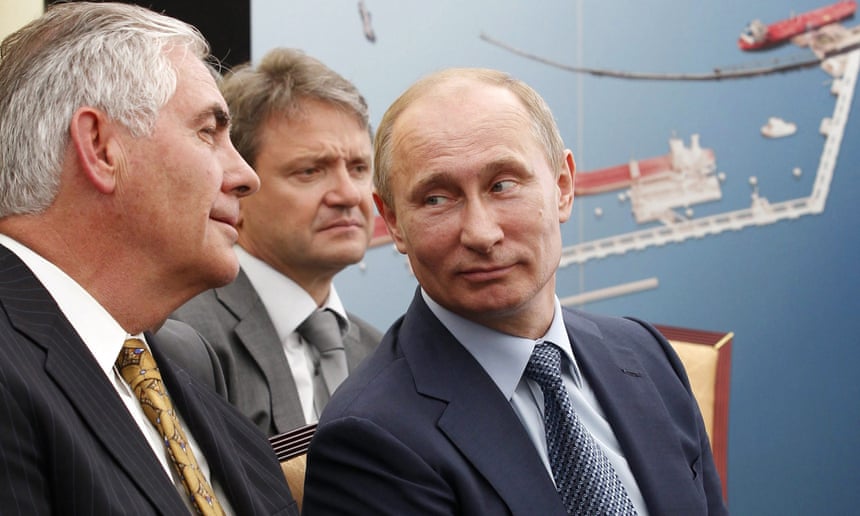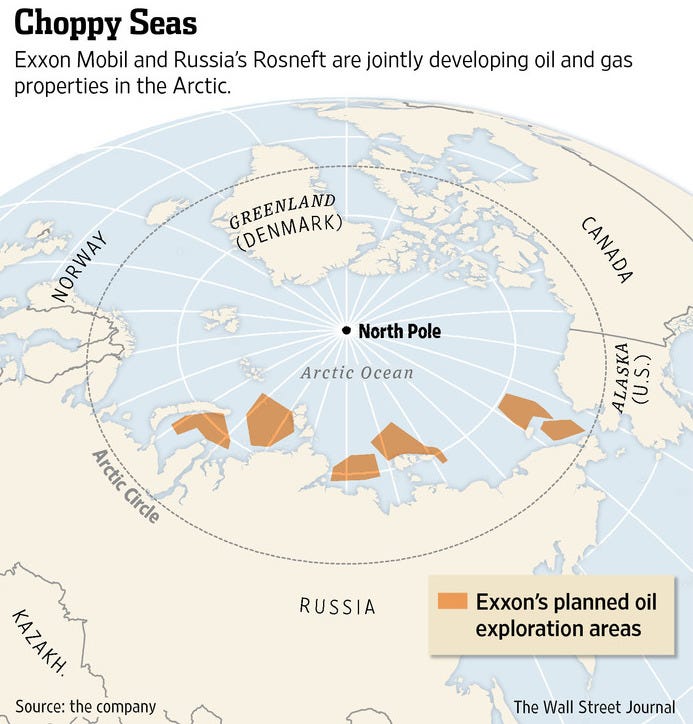Big Oil And The Traditionalist International
Posted by Big Gav in donald trump, exxon, vladimir putin
During the US election campaign I occasionally wondered if a Trump administration might occasionally do some oddball things that had positive outcomes. Even after the election he made time to meet with Al Gore and Leonardo Di Caprio to talk about global warming, which could have been seen as a sign there could be some hope of some forward looking policies on clean energy.
As his cabinet appointments have been announced though, it has become clear that a Trump administration is going to be dominated by fossil fuel interests even more heavily than the Bush / Cheney regime was, with the announcement of Exxon CEO Rex Tillerson as Secretary of State showing that US foreign policy will remain single-mindedly focused on oil for the foreseeable future.
Exxon has been looking to expand its presence in Russia for some time and Vladimir Putin awarded Tillerson the Russian "Order of Friendship" in 2013 after they negotiated a deal trading access to oil fields in the Russian Arctic for Exxon in exchange for Russian access to oilfields in Texas.
Joe Romm thinks that the Trump-Putin petrostate axis is going to focus on destroying international action on global warming, noting "the aligning interests between Russian President Vladimir Putin, Russia’s choice for U.S. president (Donald Trump), and Big Oil represents the gravest threat to humanity (and democracy) since the rise of the Axis powers in the 1930s. That’s because while Trump may not be able to destroy global climate action and the landmark 2015 Paris climate deal all by himself — as he pledged to do during the campaign — he probably could do that with help from Russia and the trillion-dollar oil industry."
This cannot be overemphasized.
— Alex Steffen (@AlexSteffen) December 13, 2016
The Russian economy is basically oil, gas + a bit of coal, metals, fertilizer—it's a greenhouse gas economy. https://t.co/gJJ4q9e0EC
The grassroots backing for this new axis of evil is coming from what is being dubbed in some quarters as the "Traditionalist International", a 21st century reversal of the old communist international concept - with Moscow looking to promote extreme nationalism along with a return to feudal social structures and other "traditional" practices like fossil fuel based transportation and power generation.
The Economist has a good summary of this Russian push to retard progress in the West via the "alt right" in the United States and far right wing groups in Europe and elsewhere - Russian propaganda is state-of-the-art again.
From the Mediterranean to the Pacific, Mr Putin is hailed as an example by nationalists, populists and dictators. “My favourite hero is Putin,” said Rodrigo Duterte, the brutal president of the Philippines. Mr Trump called Mr Putin “a leader far more than our president.” In Italy Beppe Grillo’s Five Star Movement took Mr Putin’s side against the West, and the anti-immigrant Northern League, led by Matteo Salvini, has enthused about his Russia. “No clandestine immigrants, no squeegee merchants and no Roma encampments [in Moscow],” tweeted Mr Salvini during a visit in 2014.In France Marine Le Pen, whose National Front received a loan from a Russian bank, attacks the European Union and America for being too aggressive towards Russia. In the words of Dimitar Bechev, the author of a forthcoming book on Russia in the Balkans, “Putin enjoys a cult status with all holding a grudge against the West.” Nowhere is that status greater than with the nationalists of America’s “alt-right”. Matthew Heimbach, the founder of the Traditionalist Worker Party and a crusader against “anti-Christian degeneracy”, told the New York Times he sees Mr Putin as “the leader of the free world.” He called for the creation of a “Traditionalist International”—a reference to the Communist International founded in 1919.
The last time Russia had such a role in crystallising anti-establishment ideas was in the 1920s and 1930s, after the Bolshevik revolution. When Stalin wrote that the Soviet Union had become an “open centre of the world revolutionary movement”, it was not just propaganda. ...
Today, 25 years after the Soviet collapse, Russia is again seen as an emblem—this time of a nationalist imperial order. And just as in the 1930s, its isolationism does not prevent it from being involved in the global populist, anti-establishment trend. The Kremlin’s bet on marginal right-wing parties has paid off as they have moved into the mainstream. It has pumped out disinformation and propaganda both through its official media channels, such as the RT and Sputnik news networks, and through thousands of paid internet trolls. Its cyber-attacks against Western countries produced troves of emails and documents which it dumped into the hands of foreign media, disrupting America’s presidential elections to the benefit of Mr Trump. ...
Unlike the Socialists of the 1930s, the Kremlin and its friends today are driven not so much by ideology as by opportunism (and, in Russia’s case, corruption). Mr Putin’s primary goal is not to present an alternative political model but to undermine Western democracies whose models present an existential threat to his rule at home. Having lived through the Soviet collapse, he is well aware that the attraction of the prosperous, value-based West helped defeat communism. The retreat of that liberal democratic idea allows Russian propagandists to claim a victory.










